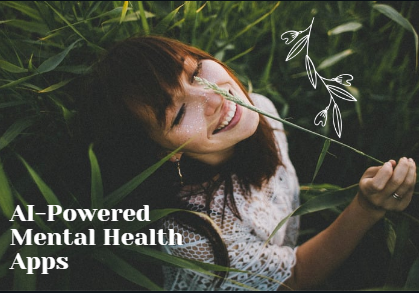In 2025, artificial intelligence (AI) has transformed mental health care by providing accessible and personalized support through various applications. These AI-powered mental health apps have become essential tools for individuals seeking emotional assistance, mood management, and overall well-being enhancement. This article examines the leading AI mental health apps of 2025, their features, benefits, and the changing landscape of digital mental health care.
### Introduction to AI Mental Health Apps AI mental health apps utilize advanced algorithms and machine learning to deliver tailored emotional support, cognitive behavioral therapy (CBT), mood tracking, and crisis management. These applications aim to supplement traditional therapy sessions by offering continuous support and resources directly to users.
### Leading AI Mental Health Apps in 2025 1. **Wysa**: This AI emotional support chatbot employs CBT techniques to help users manage stress, anxiety, and sleep issues. Wysa adapts to user interactions, offering personalized exercises such as guided breathing and mindfulness practices. With FDA recognition and over 5 million users, Wysa effectively combines AI support with clinical strategies for daily mental wellness.
2. **Earkick**: This platform leverages real-time biomarker analysis alongside a multi-modal language model to provide comprehensive mental health support. By tracking physiological markers and conversational data, Earkick creates personalized interventions that evolve based on user needs, ensuring a tailored approach to mental health care.
3. **EmoBay**: EmoBay provides 24/7 conversational support and mood tracking via a user-friendly chatbot interface. It offers immediate, stigma-free emotional assistance and self-help resources, making it accessible to users in need. EmoBay enhances engagement with multilingual support and voice-based interactions.
4. **Replika**: This generative AI chatbot app allows users to create a personalized companion that offers emotional support and companionship. While it has faced criticism for managing explicit content, it remains popular for its ability to connect with users emotionally and help alleviate feelings of loneliness.
5. **Troodi**: Designed specifically for children, Troodi is a GPT-powered mental health chatbot that creates a safe environment for kids to express anxieties and manage stress. Integrated into child-friendly devices, Troodi provides age-appropriate support and coping strategies.
### Why Mental Health Needs AI in 2025 – **Rising Mental Health Challenges**: Over 1 billion people globally experience mental disorders, with stress and social pressures contributing to this increase. – **Therapist Shortages**: Many regions face a shortage of mental health professionals, leaving AI apps to provide around-the-clock support without long wait times. – **Cost-Effective Solutions**: Traditional therapy can be expensive; AI apps offer affordable or free options, making mental health support more accessible. – **Convenience**: With smartphone availability, AI mental health apps allow users to access help with just a few clicks.
### Key Features of AI Mental Health Apps – **AI Chatbots**: Smart chatbots, like Woebot and Wysa, provide real-time conversations using natural language processing (NLP) to respond empathetically to users. – **Personalized Plans**: These apps track users’ moods, sleep patterns, and stress levels, suggesting daily routines and coping strategies tailored to their needs. – **Mood Tracking**: Users can log their moods, allowing AI to identify patterns and detect early signs of depression or anxiety. – **Voice Recognition**: Advanced AI can analyze voice tone to identify stress or sadness, helping in early emotional issue detection. – **Wearable Integration**: Some apps, such as Youper, sync with devices like fitness trackers to monitor health metrics like heart rate and sleep quality.
### Benefits of AI Mental Health Apps – **24/7 Availability**: Users can seek support anytime, including nights and holidays. – **Privacy**: Many apps allow users to express themselves without judgment, as data is kept secure and confidential. – **Immediate Feedback**: Unlike traditional therapy, AI apps offer instant suggestions and exercises based on user inputs. – **Non-Judgmental Space**: Interacting with AI can feel safer for many users, as it lacks emotional bias. – **Consistent Monitoring**: AI apps can track users’ progress and alert them to worsening symptoms, helping prevent crises.
### Additional Notable Apps – **Woebot**: Incorporates CBT and dialectical behavior therapy (DBT) with a friendly chatbot interface, tracking moods and offering journaling tools. – **Youper**: Uses AI for emotional health tracking and conversation-based therapy, compatible with wearable devices. – **MindDoc**: Developed by psychologists, it offers screening tools for depression and stress, along with personalized self-help resources.
### The Evolution of AI The effectiveness of AI mental health apps increases with user engagement. These apps learn from user data to provide personalized support and adapt recommendations based on emotional patterns and potential future challenges.
### Privacy and Ethical Considerations AI mental health apps must address several ethical and privacy issues: – **Data Security**: Apps collect sensitive emotional data; thus, adherence to GDPR and HIPAA regulations is critical in protecting user privacy. – **Ethical AI Use**: Developers should ensure AI complements rather than replaces human therapists, providing supportive tools for users. – **Bias Prevention**: Training AI on diverse data sets helps ensure equitable treatment for all users.
### Future Trends in AI Mental Health Apps – **Multilingual Support**: Expanding language options in apps increases accessibility. – **Emotion Detection**: Future applications may utilize facial recognition to gauge emotions through users’ expressions. – **Virtual Reality Therapy**: Some apps are integrating VR technology to create calming environments for therapeutic purposes. – **AI-Human Collaboration**: Combining AI check-ins with live therapist interactions offers a holistic mental health care approach.
### Limitations of AI Applications While AI mental health apps are beneficial, they have limitations: – They do not replace clinical diagnoses. – They may struggle with complex mental health conditions like bipolar disorder or schizophrenia. – Understanding deep trauma or cultural nuances can be challenging. – Users require reliable internet access to utilize these tools.
### Choosing the Right AI Mental Health App – **User Reviews**: Positive feedback can indicate an app’s effectiveness. – **Expert Involvement**: Select apps developed with mental health professionals. – **Privacy Policies**: Ensure that data protection measures are in place. – **Trial Versions**: Many apps offer free trials to assess their suitability before committing.
### Conclusion By 2025, AI-powered mental health apps have emerged as valuable resources for individuals seeking support. While they are not substitutes for professional therapy, they provide essential tools for managing mental health daily. As technology advances, these applications will likely become even more integrated into mental health care, responding to the growing need for accessible and effective support.



